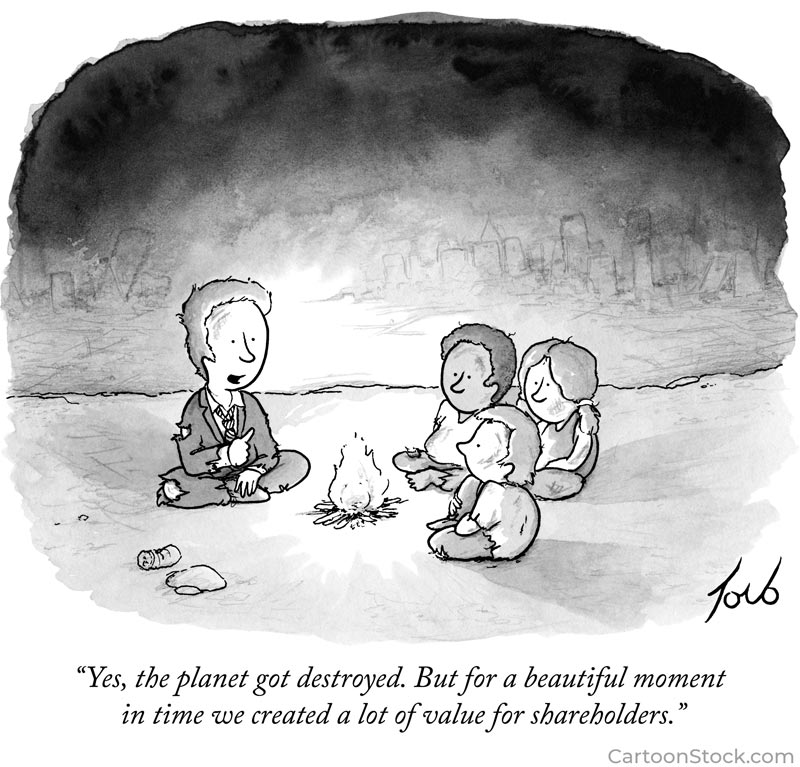Nonprofits Have Been Right All Along: Community Benefit Models Can Solve Our Toughest Environmental Challenges
Nonprofits have been leaders in building sustainability for generations. Nonprofits can be the catalysts for the systemic change in consciousness we so desperately need by advocating for a community-benefit approach in our economic system.

The nonprofit sector has had the solution to what ails our environment for decades.
If you support the mission of a nonprofit as an employee, volunteer, or donor, something in you already understands this truth.
In many ways, the nonprofit sector exists to fill the needs of those who have fallen out of an economic system that was never intended to care for the whole community. Nonprofits endeavor desperately to fill the gaping holes through which so many fall due to our society’s inadequacy in caring for all people, regardless of their economic means. Most nonprofits clearly see economic enablement as part of our missions.
Nonprofits advocate and serve more than people and are in a unique position to provide a meaningful cultural and psychological shift to arrest fossil fuel induced global warming. Nonprofits understand that fresh air, clean water, and healthy soils are not there for the benefit of just a few. Nonprofits have long understood something that others have failed to see: We are all community and we are all connected.
We live in a world where our economic system significantly undervalues natural and human resources and rewards exploiting the natural world for private profits, resulting in degradation of life. Natural resources necessary for all life are controlled by a small group of individuals and corporations.
View the full interview with Greta Thunberg & Kevin Anderson on YouTube.
Video courtesy of climateuncensored.com
As individuals, it’s natural to feel like there’s no stopping this process. We all live inside this system, and it can be hard to see any other way of doing things. We’ve come to believe there is no other way of living.
Nothing could be further from the truth.
We need a drastic change of consciousness in how we define and measure a successful life. Deep down, nonprofits already know what that means.
The Community Benefit Model
Nonprofits have been on the vanguard for generations by showing us the value of community benefit. Through a community-first approach, nonprofits create a sustainable model that works towards the well-being of the entire community, not just those with the most economic wherewithal.
As I have said elsewhere[1], when your orientation is to the community first, your priorities are aligned in that direction. Nonprofits operate by doing the right thing for their community. That creates long-term thinking, not short-term profit maximization which has led to extensive environmental devastation.
But instead of seeing the nonprofit model as the leadership that our country has needed, and needs now more than ever, nonprofits have been relegated to the fringes of political discourse and derided for their focus on outcomes not private profit.
Ironically, corporations that are destroying our environment often create the very conditions that lead to many of the social problems that nonprofits are trying to cure.
We have been taught to look up to and respect those who serve themselves first rather than those who are working for community. Our culture and economy reward and value the titans of industry who benefit from the system that dramatically undervalues natural resources; we overlook the wisdom of nonprofit leaders who are trying to create a fairer world and treat them like they are second class citizens.
It’s time for that to stop and for nonprofits to take up their natural place in our society. If there is any hope for our country and world, it is through placing the highest priority on caring for the earth, and for all the diversity on it, through community-benefit approaches. It is not about raging against the machine but rather utilizing what nonprofits intuitively know: we are running out of time and need our consciousness tuned to community value.

Nonprofit Visionaries
In a tweet on August 15, 2020, the Dali Lama wrote:
We need to think of each other as sisters and brothers, and to be concerned with each other’s welfare. We must seek to lessen the suffering of others. Rather than working to acquire wealth, we need to do something meaningful, directed toward the welfare of humanity as a whole.
Does this sound familiar? Does it remind you why you joined a nonprofit in the first place? For those of us who have dedicated our lives to nonprofits, we know it’s about the mission of helping others, giving back, and restoring balance. You have known all along that our present economic system is not serving us and you have been doing your best to show a better way. You are not bleeding hearts, you are visionaries. You know in your gut that we need to think differently about how we allocate our resources as a community. Now it’s time to turn that vision into reality.
According to the paper, Experimental Evidence for Tipping Points in Social Convention[2], once a population has arrived at a consensus, it only takes about 25 percent of the group to overturn the opinion of the majority. Twenty-five percent. Nonprofits are already the third largest employer in America. In addition to that, 25 percent of people in our country volunteer.
That is one heck of a movement in the making! I know that there are a variety of perspectives in the nonprofit sector, but no matter your position on one social issue or another, you are in the nonprofit sector because you want to make a difference. You want to make the world a better place. That is what got you here and that is what keeps you working in the nonprofit sector.
Everything we hold dear is at risk unless we find a way to tip the scales toward a livable world that does not depend on an economic system that must continuously exploit the natural world and all living things on it, to assure the success of a few at the top.
Nonprofits have always known that by working together, by trying to make life better for others, we all benefit. This is the consciousness that must now prevail in our world. Community nonprofits have been right all along.
Nonprofits, Understand Your Worth
Those who work and volunteer in the nonprofit sector understand that preserving and sustaining the community is essential to sustaining life. Now, we must figure out how to do that on a global scale.
We must find an equilibrium that works for everyone. As the divide between the haves and have nots continues to grow, our world is facing a disastrous future. We are all in the same boat and it is heading towards the waterfall. Some live in luxury cabins on the top floors and some are in steerage below deck, but all of us are going to feel the impacts of climate destruction at some point.
We can’t keep taking without giving back — we have to sustain the community. Nonprofits have known that all along.
Leaders in the nonprofit sector have long understood the importance of working together to create community value. There are tens of thousands of you who know more about community organizing than I ever will. How can nonprofits use our vast networks to become a tipping point toward creating a livable world for all? What can we do to harness the power of nonprofits to bring about the change we need now? Share your thoughts by contributing to Blue Avocado or posting your comments below.
Sources
[1] https://insurancefornonprofits.org/How-to-Build-an-Insurance-Company-or-Any-Business-with-Community-at-the-Center.pdf
[2] Science 8 June 2018, Vol 360, Issue 6393, pp. 1116-1119
You might also like:
- Moving Beyond Performance: Making DEI Actionable
- Can You Hear Us Now? Using Feedback to Create Community-Centered Services
- The 3 ‘Rs’ of Equitable Community Engagement
- Four Ways to Remove a Board Member
- Is There An Inequality Tipping Point for Nonprofits?
You made it to the end! Please share this article!
Let’s help other nonprofit leaders succeed! Consider sharing this article with your friends and colleagues via email or social media.
About the Author
Pamela Davis is the founder, president, and CEO of an affiliated group of nonprofit insurers known as Nonprofits Insurance Alliance® (NIA), the publisher of Blue Avocado. Pamela has grown NIA from a loan of $1 million from a group of foundations to over $314 million in premiums and $874 million in assets as of 2023, serving over 27,000 nonprofits across the country. All NIA affiliates are 501(c)(3) nonprofits, just like the organizations that they insure, and all NIA assets belong to the community, just like they should! Follow her on Twitter @pamela_e_davis
Articles on Blue Avocado do not provide legal representation or legal advice and should not be used as a substitute for advice or legal counsel. Blue Avocado provides space for the nonprofit sector to express new ideas. The opinions and views expressed in this article are solely those of the authors. They do not purport to reflect or imply the opinions or views of Blue Avocado, its publisher, or affiliated organizations. Blue Avocado, its publisher, and affiliated organizations are not liable for website visitors’ use of the content on Blue Avocado nor for visitors’ decisions about using the Blue Avocado website.








Non profits have to lead, but even they are very reluctant to discuss the need for a much fairer economy, and therefore a much smaller economy. Even environmental groups like to talk about Green growth, but it is not possible on an Earth with such depleted resources. Very hard to bite the hand that feeds, which is why when I did this work, I had to do it outside of my job. But it is time to speak truth to power and resist the corporatization of everything.
Greg, I completely agree with you. We need to de-grow the economy and stop using GDP as a measure of success. We cannot continue with our 18 TW energy usage and expect to produce that much power with renewables. We live on a finite earth and cannot endure our seemingly infinite demands on it. It should be socially unacceptable to be an energy hog and yet, right now we laud the consumerist lifestyle. I have reduced my own carbon footprint to very close to zero and yet my appreciation of this life has not been diminished one bit. Quite the contrary. There is so much sweetness in simplicity if we would stop fearing it. If we don’t voluntarily roll back our consumption significantly, the earth will do it for us in the most devastating way.
Of all the Boards I’ve worked with, the most productive has been the one where the chair actively sought out staff members to communicate with. google [google](https://google.com)
Pamela, your article is brilliant and so urgently necessary and timely. As a leader for a non-profit theater company that aims to “create community through celebration”, and aims to highlight cultures and traditions from around the world for its annual holiday production, I’m working to refine our vision and values, which includes defining “community” as “Community of Place” and “In-person/physical Community”, and spelling out why that is valuable, and exactly how we as a theater company can tangibly do this when that goal, on its face, is very abstract.
I’m also working hard at convincing my fellow directors that “traditions” and “culture” are all derived from our experience, as humans, within and relationship to the natural world, our particular environments, and Earth itself, over time, as we adapt to it and with it over the millenia. I firmly believe that re-establishing our knowledge of this connection (because we are connected whether we know it or not), is the ONLY basis upon which we can strive for social, ethnic, inter-national, etc. harmony AND survival, in the face of our biodiversity crisis and climate change. I don’t think we can truly understand tradition and culture without understanding that we must conscientiously create more unifying cultures around our current environmental challenges and goals.
I’m hoping to incorporate this more Earth-centered ethos into our theater company’s idea of what tradition and culture are, and I’m sharing your article with my fellow directors in hopes that it will help. Thank you! (NIAC policy holder)